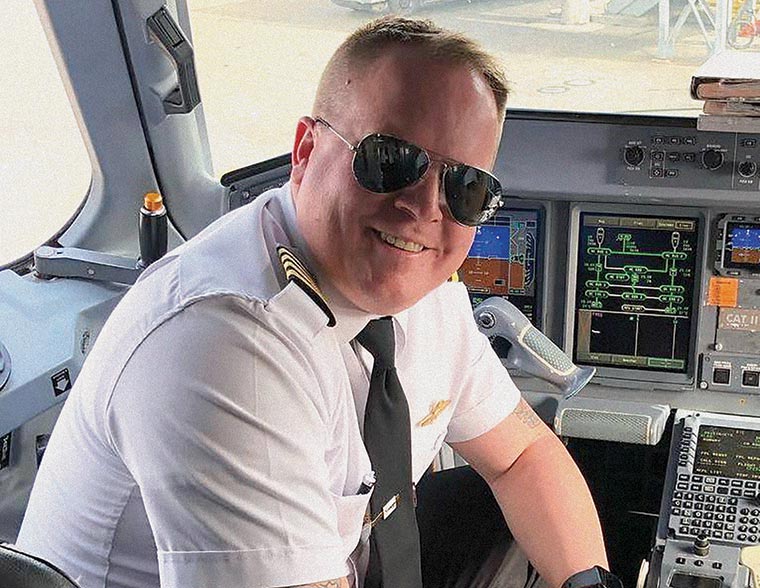Our Stories: Former Enlisted Serviceman Brings Different Perspective to Compass Cockpit
By John Perkinson, Senior Staff Writer

Capt. Josh Walden (Compass) recently upgraded to captain on the E175.
Since the beginning of commercial air travel, the armed forces have provided an ongoing source of pilot candidates to airlines. But not all of these servicemen and women have come from the military pilot ranks. Take Capt. Josh Walden (Compass), for example. Prior to flying E175s for Delta Connection and American Eagle, Walden was a helicopter mechanic in the U.S. Army.
A member of the Arizona Army National Guard, Walden spent much of his time working on the unit’s 24 AH-64 Apache Longbow attack helicopters. He concentrated on rotor heads and blades, gearboxes, and transmissions, and was occasionally called upon to perform “nondestructive inspections.”
“To understand what that means, think of the fan-blade casing that cracked on Southwest Flight 1380 last April,” said Walden. “The accident investigators had to perform nondestructive inspections to determine the cause and verify issues as well as identify problem engines.”
Walden enlisted in the U.S. Army in 2010, after deciding that two years of college was enough. In addition to helicopter maintenance work, he spent a year advising on, assisting with, and monitoring the U.S./Mexico border, in conjunction with U.S. Customs and Border Protection and other related government agencies. He participated in Operations Copper Cactus and Guardian Eye, “the highlight of my military career,” he remarked.
In time, Walden decided to pursue other career interests. Because the need for helicopter maintenance was consistent enough to warrant full-time mechanics, he was soon hired as a federal civil service technician. However, the budget sequestration of 2013 placed his new position in jeopardy, and Walden noted that there was a period when he didn’t get paid. Instead, he decided to pursue a flying career.
Leveraging literally everything he had, Walden flew whenever he could. In short order, he built up his hours as a certified flight instructor and later flew as a corporate contractor. Reaching the required 1,500 hours of flight time, in 2016 he left the Army National Guard and was hired by Compass Airlines.
Walden, who recently upgraded to captain, serves as his pilot group’s Military Affairs Committee chair and is currently working on a four-year online college degree program. He views his ALPA volunteer work as a way to “pay it forward,” acknowledging that so many have helped him along the way. Yet his transition to airline flying wasn’t easy.
“There’s a stigma about hiring airline pilots from the enlisted service ranks,” Walden observed, contending that many in these positions are well suited for airline flying, particularly those with aviation-related specialties. As a helicopter mechanic, Walden said that he brings a fundamental understanding of system knowledge to the job—an asset that gives him a leg up on many of his nonmilitary peers.
“The military teaches discipline, situational awareness, and a laser-like attention to detail—skills you need to be an effective pilot,” said Walden. As evidence of this latter trait, he recalled a particular event that proved to be a life lesson. A naïve private first class, Walden left a $700,000 part (“a flight-safety-critical component”) on a helicopter, rather than tag it and place it on a nearby table, as procedure dictated. He then left to get lunch.
“It was a humbling moment,” acknowledged Walden, who remembered, “I was called back to fix my mistake.” He ended up paying for it with four hours of what he described as “strenuous physical training.” Walden observed, “That helicopter was safe and airworthy at all times and that was because of the stellar group of noncommissioned officers I worked with.” He noted, “Rest assured, I never made that mistake again.”
Some of Walden’s former officers have since reached out to him to find out how they can become airline pilots. He relayed that flying time is critical and that flight schools are always hiring flight instructors, which is a great way to build that time.
From a broader perspective, Walden noted that enlisted servicemen and women with aviation-related specialties might just be an untapped resource for airlines looking for future pilot candidates, particularly fee-for-departure carriers. “The military has given these individuals the foundation they need to excel as pilots. Why not take advantage of this?” he asked.

